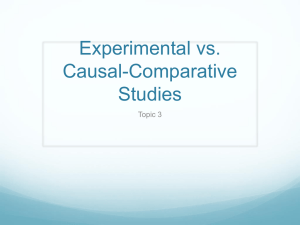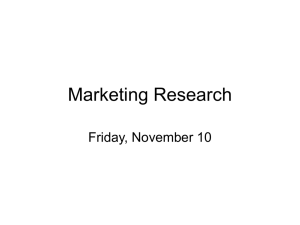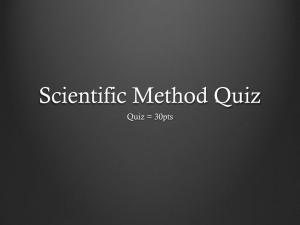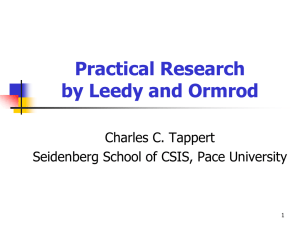UNDERSTANDING RESEARCH METHODS
advertisement
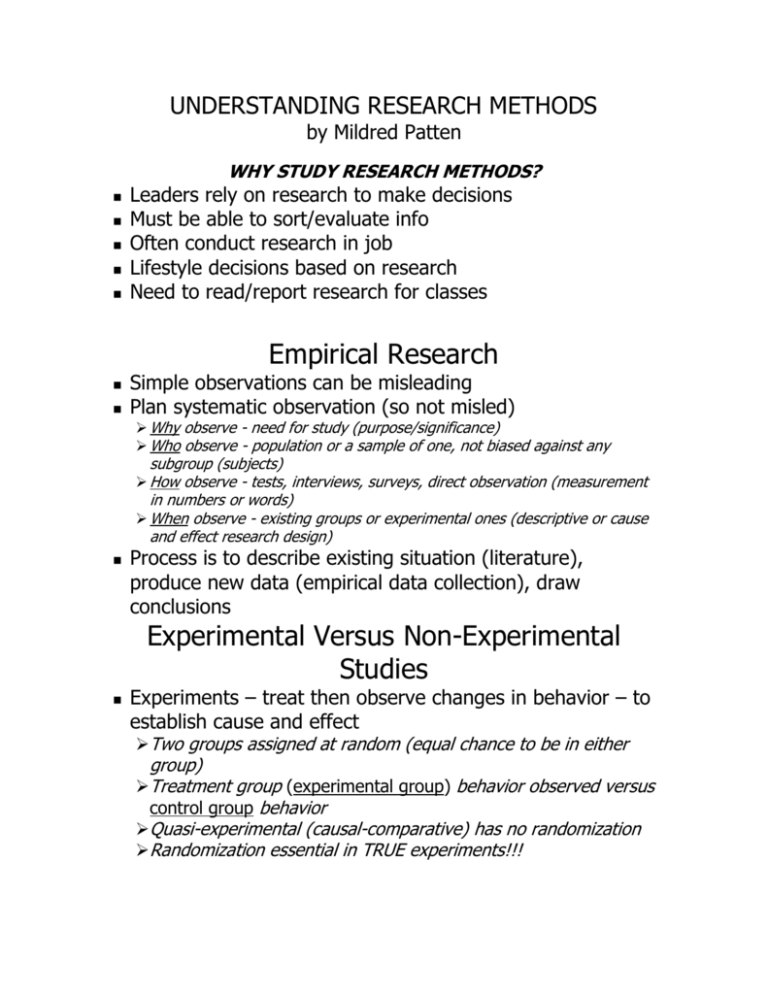
UNDERSTANDING RESEARCH METHODS by Mildred Patten WHY STUDY RESEARCH METHODS? Leaders rely on research to make decisions Must be able to sort/evaluate info Often conduct research in job Lifestyle decisions based on research Need to read/report research for classes Empirical Research Simple observations can be misleading Plan systematic observation (so not misled) Why observe - need for study (purpose/significance) Who observe - population or a sample of one, not biased against any subgroup (subjects) How observe - tests, interviews, surveys, direct observation (measurement in numbers or words) When observe - existing groups or experimental ones (descriptive or cause and effect research design) Process is to describe existing situation (literature), produce new data (empirical data collection), draw conclusions Experimental Versus Non-Experimental Studies Experiments – treat then observe changes in behavior – to establish cause and effect Two groups assigned at random (equal chance to be in either group) Treatment group (experimental group) behavior observed versus control group behavior Quasi-experimental (causal-comparative) has no randomization Randomization essential in TRUE experiments!!! Non-Experimental Research No treatments given Observe and describe Often called descriptive research The type of measurement used does not indicate whether or not research is experimental Cause and effect determined by true experiments, only suggested by quasi Experimental Versus Causal Comparative Studies Experiments establish cause and effect Often unable to experiment due to legal, ethical, physical, financial reasons Alternatives ► Quasi-Experimental See an effect that has occurred Look at past to determine cause (ex post facto research) Use controls such as matching Dangers in Quasi-Experimental Studies (aka Causal-Comparative) Common cause for both the cause and the effect being investigated stress causes smoking and cancer Difficult to establish that experimental and control groups are equivalent Essentially observational or descriptive, BUT goes a step further to explore causality Types Of Non-Experimental Research Causal Comparative (quasi-experimental) – describe existing differences, try to identify cause Survey/poll (descriptive) – observe and describe attitudes, opinions, behaviors (can be self-observation) Case study – in depth study of one case (individ/group) Longitudinal research – observe same subjects over a long time period Correlational – observe relationships, make predictions Historical – examine existing data to test hypotheses Topics 1-4 REVIEW QUESTIONS What does empirical research mean? What is the purpose of experimental research? What is the difference in experimental and causal comparative (or quasi-experimental) research? What is the difference between experimental and non-experimental research? If I conduct a study of students to determine their attitudes toward tuition rates, what type of study is this? Variables In Non-Experimental Research Variable – A trait that can vary/change Categorical variables (gender) Mutually exclusive (no overlapping categories) Exhaustive (all possible choices provided) Quantitative (grade point average) Measure in real numbers Independent versus dependent (in causal investigations) Cause is independent Variables In Experimental Studies Experiments have AT LEAST one independent variable (IV) and one dependent variable (DV) Experiments investigate how a change in the IV affects the DV IV is manipulated and change in the DV is measured Non-experimental studies have no manipulation Simple experiment = one IV and one DV Complex = more than one IV or DV Topics 5-6 REVIEW QUESTIONS What type of variable (Categorical or Quantitative) is gender? test score? race? times logged on to the library site? Gender test score What is an independent variable (IV)? What is a dependent variable (DV)? race times logged If I want to examine whether incentives affect productivity, what variable is the IV (and DV)? Research Hypotheses, Purposes, And Questions Research hypothesis predicts the outcome of a study Directional (one group will score higher) Direction is based on previous research Null hypothesis tested statistically Non-directional (a difference will be found) Research purpose or research question often used here Research questions should be interesting (how groups differ, not simply do they differ) Operational Definitions Conceptual or constitutive – dictionary meaning Operational – specific steps used to measure the variable A matter of degree Strive to allow replication of the study Replication by other researchers enhances confidence in results Topics 7-8 REVIEW QUESTIONS What is a research hypothesis? It is hypothesized that athletes will have higher GPAs than non-athletes. Is this a research question or a hypothesis? Explain the difference between operational and conceptual or constitutive definitions. If I define intelligence as the number of minutes it takes a person to solve a puzzle, is this a conceptual or operational definition? Quantitative v. Qualitative Research (Part I) Quantitative Deductive (read literature, deduce hypothesis, test) Structured measures (surveys use numbers) Large sample (subjects); generalize to population Researcher removed from process Qualitative Inductive (observe local situation, propose theory) Unstructured data collection (words/themes) Small sample; limit conclusions to group studied Researcher involved (participants); individual quotes Quantitative v. Qualitative Research (Pt. II) Research Questions (RQ) dictate type If RQ unclear or little is known in literature, may need qualitative Time/Money/Subject availability Limited subject availability means quantitative Qualitative takes more time and money Often combine both Initial qualitative investigation leads to quantitative Topics 9-10 REVIEW QUESTIONS If I want to determine how much people tend to pay for new cars, is this likely to be quantitative or qualitative research? If I want to see why police officers fail to give DUI tickets to drivers who are obviously impaired, is this better suited to qualitative or quantitative? Surveys tend to what kind of research? What type of research has the greatest potential for researcher bias? Program Evaluation Evaluation Research (not usually experimental) Applied (not basic) research Includes needs assessment (of those served) Formative – evaluate (modify) during program Process is evaluated (how implementing) Progress is evaluated (goal attainment) Summative – end of program goal attainment (may have comparison group) Ethical Considerations in Research Standards followed in research community Protect subjects from physical/psychological harm Review committees used for legal protection Subjects have rights (privacy, confidentiality, knowledge of purpose) Informed consent required (tell general purpose/benefits; procedures used; potential harm; right to withdraw/refuse without penalty) Debriefing needed after study (review purpose; offer to share results; assure confidentiality) Hidden purpose often needed (ethical dilemmas) Role of Theory in Research Theory – unified explanation for discrete observations Researchers test theories Deduce hypotheses from theories and test with observations (confirm/reject hypothesis – quantitative mainly) Induce theory from observations (called grounded theory – used in qualitative) Topics 11-13 REVIEW QUESTIONS What is the difference between formative and summative evaluation? What are the rights of subjects in research? Explain the concept of informed consent: Deducing hypotheses to test theories is done in quantitative or qualitative research? PART B- REVIEWING LITERATURE (first step in planning research) Start with broad problem area Review both theoretical and research literature Helps narrow scope and develop research questions or hypotheses to test Can replicate other studies (mimic original) Modified replication (new/modified population/instrument) Focus on conflict identified in literature Benefits to Reviewing Literature Identify measurement instruments to use Avoid dead-ends and wasted efforts Learn how to write research reports Cite relevant literature in the Introduction provides context for reader and justifies doing study Reviewing literature demonstrates your expertise (located it, used it in planning, cited it correctly) Locating Literature Electronically Articles are more up-to-date than books ERIC, PsychLit, SocioFile (discussed in textbook) Infotrac I (OneFile), ABI-Inform (our library) Each article is a record, made of fields (title, author, date, descriptors) Best searching requires good descriptors (use a thesaurus to find them) Use of Boolean Operators (AND, OR, NOT) helps to narrow searches Organizing a Literature Review Describe broad problem area and define major terms Establish importance of topic by Citing other research that shows it is important enough to study Citing statistics showing broad application of topic Write topic-by-topic description (w/ headings/subhds) Group references together when about a common topic Include both methods used and results found in previous studies Sometimes need to trace the history of topic Summarize the topic at the end and indicate relevance to your study Move from least related to most related topics Preparing to Write a Critical Review (Note that this is NOT a series of reports on articles/books) The lit. review is a CRITICAL assessment of literature on a topic Your assessment of the studies reviewed should show through in your discussion of them Discuss both weak and strong points of studies reviewed (incl. sampling/instrument/limitations) See Examples in textbook Creating a Synthesis (in writing Lit. Review) Provide a whole picture of what is known about the topic An outline of subtopics is useful Move from subtopic to subtopic…each paragraph should be organized around a topic (first sentence of each paragraph is the topic sentence!) Cite together numerous authors making the same point Might devote a whole paragraph to important and central sources Give limited details on research methods to explain differences in findings, but criticize such things as small or biased samples Provide specific definitions for technical terms Use quotations sparingly Use transitional terms/phrases (As a consequence…; therefore…) Follow style manual for citing references carefully and consistently (APA) Citing References Harvard method (using author, date referencing) is the most common APA uses it and gives guidelines in APA manual Key characteristics (see text Examples 1-5) Last name can be subject of sentence (emphasizes authorship) Content can be subject (authors not emphasized) Use authors as subject when compare/contrast Reference list includes only those cited in text! Topics 14-18 REVIEW QUESTIONS What’s the first step in reviewing the literature? What are the benefits of reviewing the literature What purpose do citations serve? Why are refereed articles so important in reviewing the literature? Explain the difference between an annotated bibliography and a written literature review:

